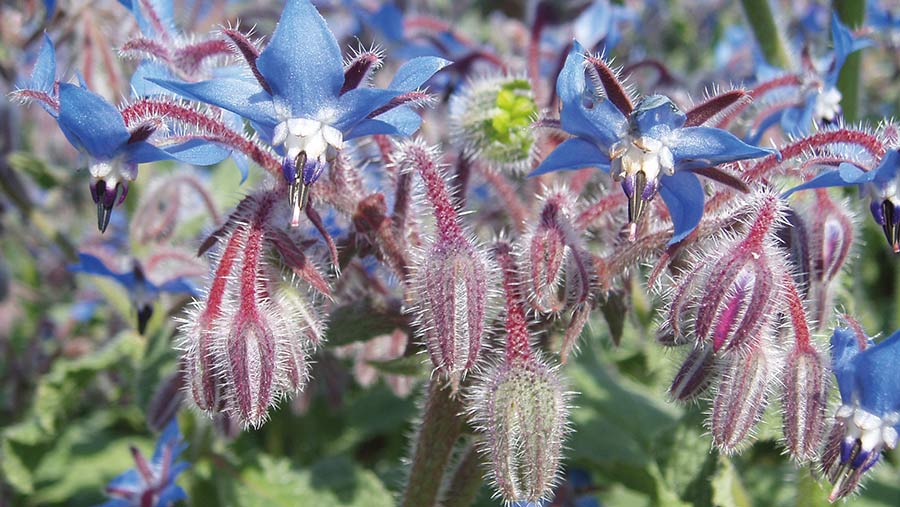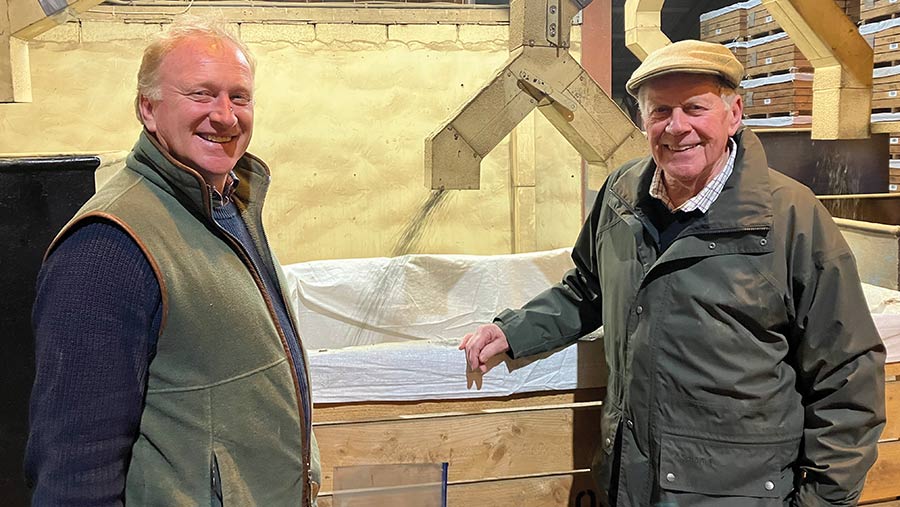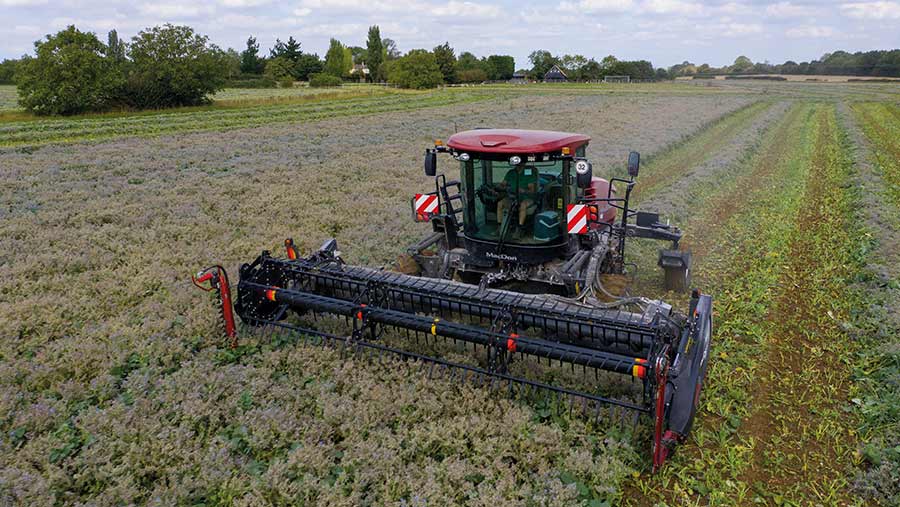Why growers should consider growing borage in 2023
 © Andrew Fairs
© Andrew Fairs Borage looks set to be an attractive break crop option this spring, thanks to a more stable and growing crop demand within the oilseeds market.
Specialist crop grower and family-run seed supplier Fairking is searching for new borage growers across England to meet demand, with a guaranteed contract price on offer of £3,850/t.
Run by father-and-son team Peter and Andrew Fairs, Fairking not only processes, markets and offers contracts to farmers, but grows a range of niche crops across 2,200ha of owned and contracted land.
See also: Round-up of niche crop options for UK growers
A consistent break crop
The Fairs are based in Essex, near Colchester, and have successfully grown borage since the early 1980s. Borage is a blue flowering crop, and its prized oil is used in food supplements, cosmetics and pharmaceuticals.
It is their most consistently performing break crop, with attractive gross margins in excess of £900/ha.
It frequently outperforms winter wheat. In fact, borage generated a higher gross margin than winter wheat for seven out of the past 10 harvests.
Peter and Andrew now grow 430ha of borage on the home farm, with an additional 100 contracted growers and more being recruited this spring.
They hope to increase the current area of 4,100ha, which extends as far north as Yorkshire and west to Herefordshire, to 5,200ha in 2023 and 6,000ha by 2024.
“We are confident in the crop and looking for more growers across England, particularly the North and the West to make the most of the cooler temperatures, which improves oil content,” explains Peter.
The benefits of borage
Borage has vigorous growth, taking just 100 days from germination to swathing.
As a late-sown spring crop, drilling takes place from the end of April to the start of May, providing a good opportunity to control blackgrass.
It is deep rooting and leaves little surface trash to create a friable soil – the perfect entry for direct-drilled winter wheat.
Andrew says that one of the biggest benefits of growing borage is the contract fixed price.
“Farmers know what they will be paid before the crop is even in the ground, allowing them to plan ahead without the risk of the unknown.”

© MAG/Emma Gillbard
The contract Fairking offers has a fixed price of £3,850/t, with expected yields of 400kg/ha. An initial seed cost payment of £160/ha is required.
An additional gamma linolenic acid (GLA) oil premium is paid at £10 for every 0.1% over the 21% threshold. Later drilling and cooler temperatures are associated with improved GLA content.
“We constantly try to improve the way borage is produced and are sourcing purer seed stocks from Holland to multiply up on the home farm to improve the seed we supply,” says Peter.
Crop challenges
One of the main issues associated with borage is its indeterminant nature, which sees it continue to flower over a long period.
Seeds form in a bell shape, which are prone to bursting open as the seeds mature and get heavier. Yield losses and volunteers can, therefore, be an issue.
Furthermore, a specialist swather and draper header is required at harvest, which may limit uptake of the crop for some.

© Andrew Fairs
However, Fairking offers free agronomy advice, meets with growers to help with potential chemical approval, and discusses swathing and harvesting methods.
“If growers are within a 50-mile radius to our base near Colchester, we even offer a swathing service,” says Peter.
Finding the optimum swathing date can be challenging and requires close crop monitoring. The rule of thumb is that on the day the first seed drops, the crop is seven to 10 days away from the start of swathing.
“We have grown borage for 40 years and haven’t found volunteers to be an issue,” says Peter. “If we had, we certainly wouldn’t still be growing it today.
“As long as you harvest it effectively to minimise losses, aiming for a moisture content of 9%, it is a great crop to grow.”
After years of growing the crop, Peter and Andrew realised that by cutting the crop tightly with the heads of the flowers in the middle of the swath and the stalks on the edge, they could limit seed loss.
Andrew explains: “A very tight swath collects any potential fallen seed in the bulk of the plant material. It effectively acts as a carpet to hold fallen seed before the combine runs through about 10-14 days later.
“The only drawback is that tighter swaths take longer to dry so you have to be patient.”
Agronomy
The Fairs drill the crop at the end of April/start of May with a Vaderstad to a depth of 2.5cm, aiming for even establishment when soils are warming.
Nitrogen requirements are low at just 70kg N/ha, which they usually apply in one hit at the rosette stage (just before flowering).
The crop is relatively robust when it comes to disease.
“Powdery mildew can be an issue, but two fungicide sprays of either azoxystrobin or elemental sulphur do a fantastic job at controlling disease at a cost-effective price,” says Andrew.
Sclerotinia can be an issue in wetter seasons where boscalid provides effective control.
Unlike oilseed rape, there is a smaller timeframe to control sclerotinia as borage is a hairy, fleshy plant that the disease can attack at any growth stage.
Andrew says: “Growing borage alongside a wide range of other late-sown spring crops, such as camelina, echium, lunaria and chia, has effectively culturally controlled blackgrass threats across the farm.”
What’s more, the crop is great for encouraging beneficial insects on farm. Insecticides are, therefore, not applied as pollinators play an important role in its flowering cycle.
“Borage is a haven for lacewings, hoverflies, wasps, bees and butterflies,” says Peter.
The farm has a close relationship with local beekeepers and places one beehive/ha across borage fields. An impressive 14t of honey was produced from 120ha of borage last year on one farm.
For more information on growing the crop and getting a contract, get in touch with Andrew Fairs.
About Fairking and its new processing plant
Fairking’s biggest niche crop is borage, and it organises the collection of the crop from farm to its cleaning and processing plant in Essex.
The firm is the sole UK agent for DeWit Speciality Oils, a Dutch company with a specialist extraction plant in Humberside.
Fairking is set to open a new seed-cleaning plant this spring, increasing capacity by 50% to 2,100t/year, designed and built by Tey Farm Systems.
It comes kitted out with a brand new optical sorter, which is able to sort seeds and remove contaminants by colour, shape and infrared density.

